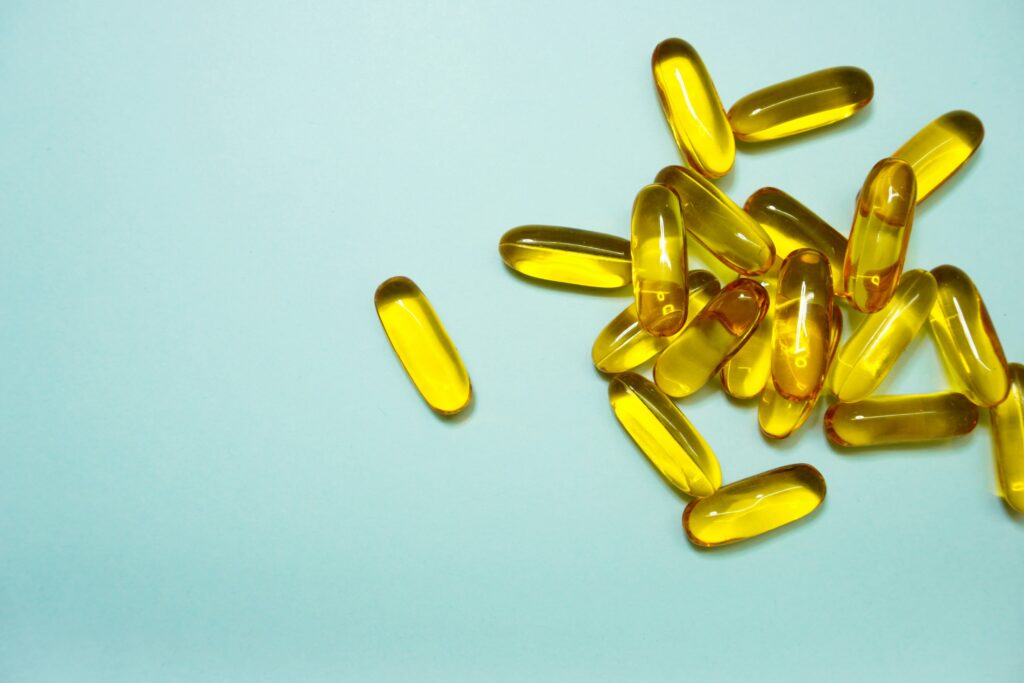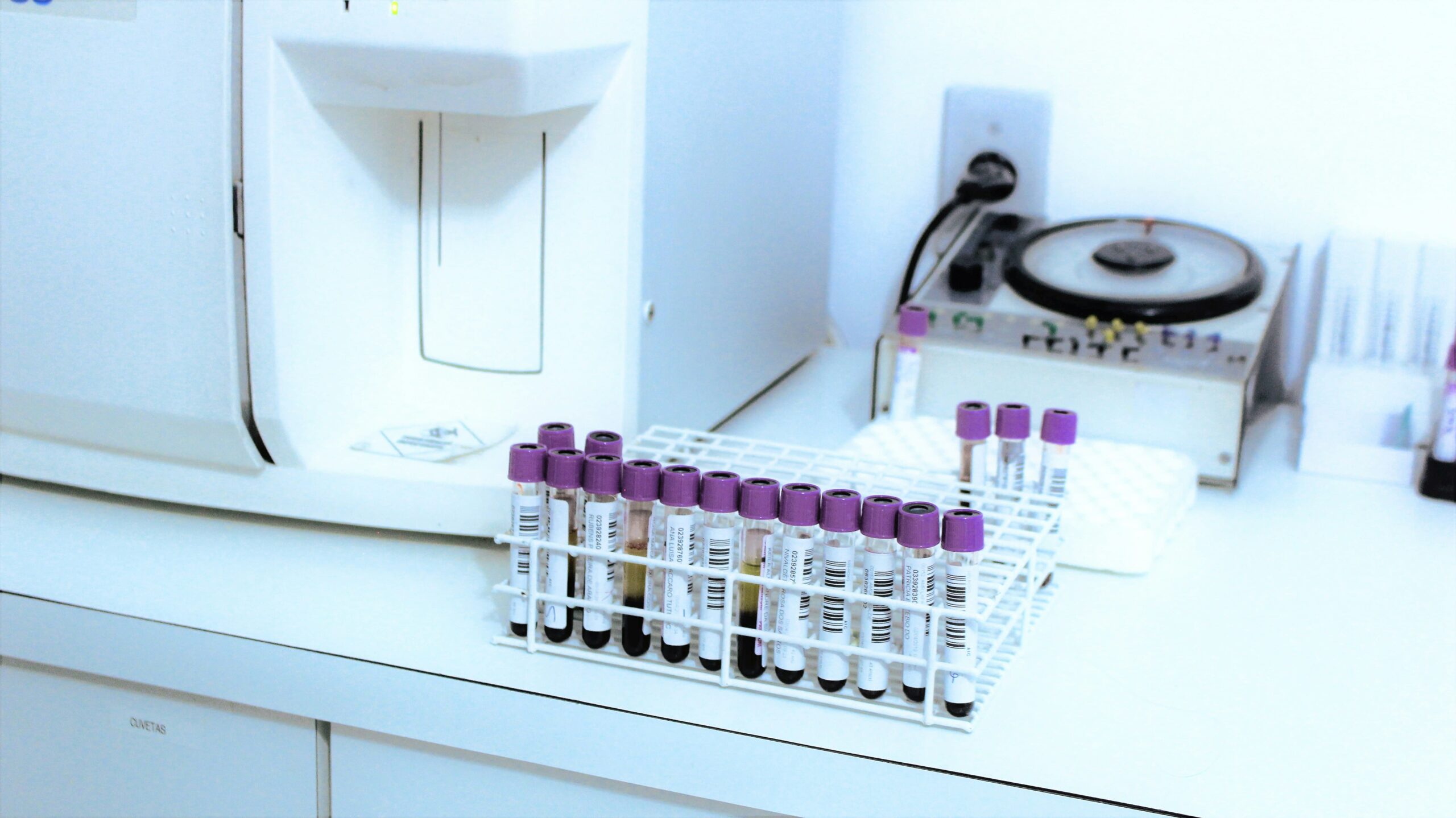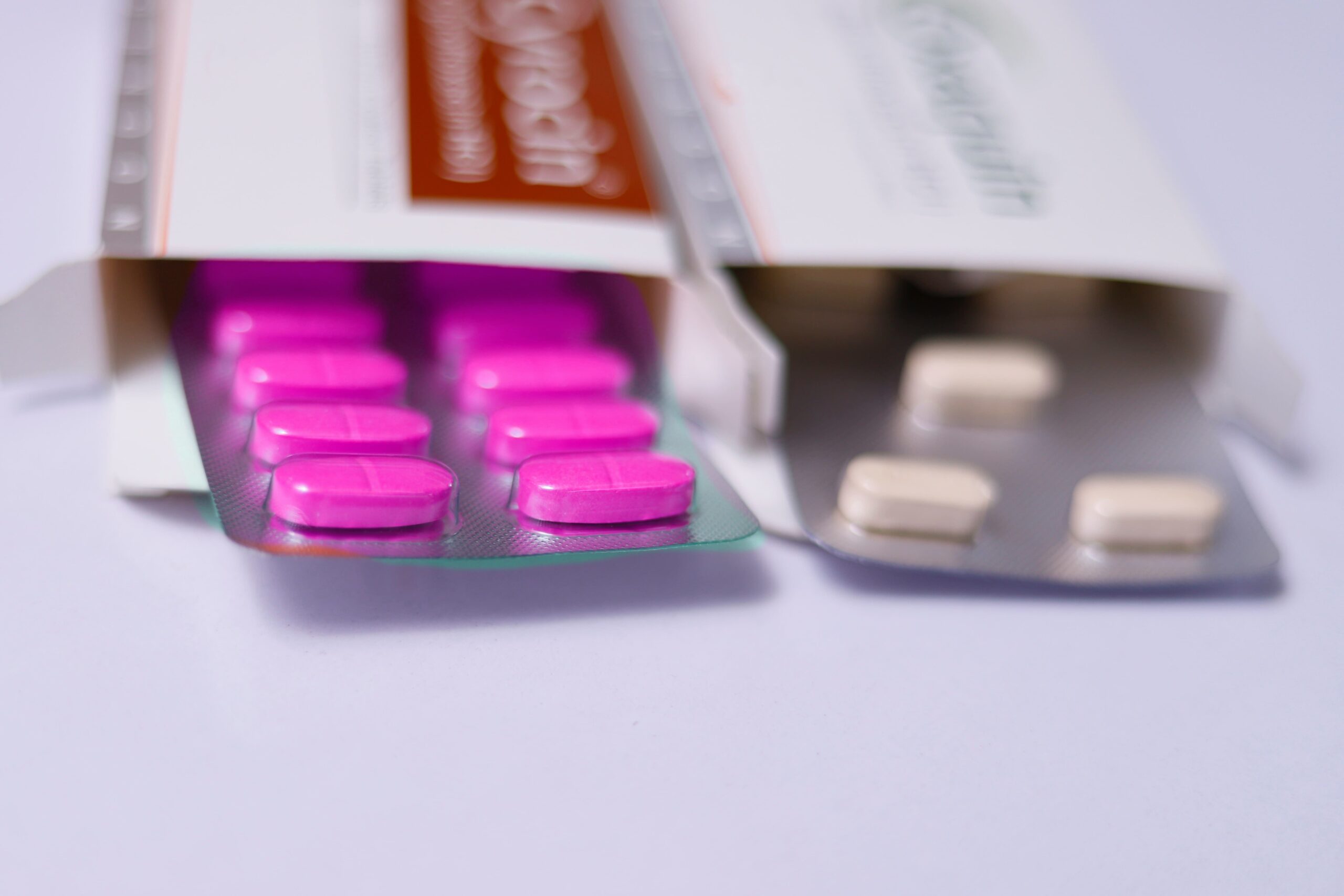
Você está cuidando da sua alimentação, mas os níveis de colesterol continuam altos? Talvez seja hora de revisar se sua alimentação está realmente adequada — veja os erros mais comuns que sabotam os resultados. Alguns suplementos podem ajudar, sim — mas outros prometem mais do que entregam. Neste artigo, você vai entender quais suplementos têm comprovação científica no controle dos lipídios (colesterol e triglicérides), como usá-los com segurança e quais evitar.
1. Ômega-3: bom para os triglicérides, para o colesterol talvez não
Os ácidos graxos ômega-3, encontrados em peixes como salmão, sardinha, truta e em sementes como linhaça e chia, têm ação comprovada na redução dos triglicérides. Estudos mostram que cada 1g/dia de EPA + DHA (tipos diferentes de ômega-3) reduz em média 5,9 mg/dL de triglicérides — e esse efeito é ainda maior em pessoas com níveis mais altos.
Porém, o impacto no colesterol LDL (o “ruim”) varia. Em algumas pessoas, especialmente quando se usa DHA, o LDL pode até aumentar. A boa notícia é que esse aumento pode estar relacionado a uma mudança no tipo de partícula de LDL (de pequenas e densas para maiores e menos perigosas). Ainda assim, é importante usar com acompanhamento profissional.
Dica prática: se seu triglicérides estiver alto, tente comer peixe 2x por semana ou suplementar ômega-3.
2. Arroz vermelho fermentado: pode funcionar, mas tem riscos
O arroz vermelho fermentado (Red Yeast Rice) contém monacolina K — um composto natural com estrutura idêntica a um medicamento usado para baixar o colesterol. Estudos mostram que ele reduz significativamente o colesterol total e LDL (o “ruim”), sendo uma alternativa para quem não tolera estatinas convencionais.
Porém, os suplementos vendidos no mercado têm grande variação na quantidade de monacolina e podem conter substâncias tóxicas, como a citrinina, prejudicial aos rins. A ausência de padronização e testes de qualidade torna seu uso arriscado.
Conclusão: pode até funcionar, mas é preferível usar estatinas prescritas pelo médico, com dose controlada e segurança garantida.
3. Berberina: nova aliada na redução do colesterol e triglicérides
A berberina, extraída de plantas como a cúrcuma-árvore e o barberry, reduz a absorção de colesterol no intestino, aumenta sua eliminação e regula receptores de LDL. Na dose certa, ela pode reduzir em média 25 mg/dL de colesterol total e LDL, além de baixar triglicérides.
É uma substância promissora, mas cuidado: é fundamental monitorar o uso, já que pode interagir com outros medicamentos.
4. Probióticos: um benefício discreto, mas real
Probióticos (como Lactobacillus acidophilus e Bifidobacterium lactis) podem ajudar a reduzir o colesterol LDL e total. Estudos com até 12 semanas de suplementação mostraram reduções de 6 a 8 mg/dL nos níveis de colesterol.
Alimentos fermentados como iogurtes enriquecidos com probióticos podem ser mais eficazes do que cápsulas.
É recomendado para quem busca um complemento leve e seguro. Lembre-se de escolher iogurte sem açúcar!
5. Suplementos que não funcionam (ou são arriscados)
Nem tudo que parece natural faz bem. Veja alguns suplementos que não devem ser usados para controle de colesterol:
- Chá verde e catequinas: podem ajudar, mas há risco de hepatite.
- Alho, policosanol, coco, água de coco, bergamota e resveratrol: evidências científicas inconsistentes ou ausentes.
- Selênio, cálcio, isoflavonas de soja: sem benefício comprovado nos lipídios.
Suplemento não substitui estilo de vida ou medicamento — e nem sempre é seguro!
Se você quer usar suplementos para cuidar do colesterol, escolha os que têm evidência científica (como ômega-3, berberina e probióticos), mas faça isso como parte de um plano completo, com dieta saudável, atividade física, acompanhamento profissional e, quando necessário, medicação.
E lembre-se: “natural” não é sinônimo de seguro ou eficaz. Sempre converse com seu médico antes de iniciar qualquer suplemento.
Suplementos podem ajudar, mas o pilar principal continua sendo a alimentação. Veja quais padrões alimentares têm mais respaldo científico para baixar o colesterol.
Veja também:
> 💡 Colesterol alto? O que você come pode ser mais poderoso do que você imagina.
Referências
- Skulas-Ray AC, Kris-Etherton PM, Harris WS, et al. Dose-response effects of omega-3 fatty acids on triglycerides, inflammation, and endothelial function in healthy persons with moderate hypertriglyceridemia. Am J Clin Nutr 2011; 93:243.
- Skulas-Ray AC, Wilson PWF, Harris WS, et al. Omega-3 Fatty Acids for the Management of Hypertriglyceridemia: A Science Advisory From the American Heart Association. Circulation 2019; 140:e673.
- Wohl DA, Tien HC, Busby M, et al. Randomized study of the safety and efficacy of fish oil (omega-3 fatty acid) supplementation with dietary and exercise counseling for the treatment of antiretroviral therapy-associated hypertriglyceridemia. Clin Infect Dis 2005; 41:1498.
- Gerber JG, Kitch DW, Fichtenbaum CJ, et al. Fish oil and fenofibrate for the treatment of hypertriglyceridemia in HIV-infected subjects on antiretroviral therapy: results of ACTG A5186. J Acquir Immune Defic Syndr 2008; 47:459.
- Mozaffarian D, Wu JH. Omega-3 fatty acids and cardiovascular disease: effects on risk factors, molecular pathways, and clinical events. J Am Coll Cardiol 2011; 58:2047.
- Ursoniu S, Sahebkar A, Serban MC, et al. Lipid-modifying effects of krill oil in humans: systematic review and meta-analysis of randomized controlled trials. Nutr Rev 2017; 75:361.
- Pan A, Yu D, Demark-Wahnefried W, et al. Meta-analysis of the effects of flaxseed interventions on blood lipids. Am J Clin Nutr 2009; 90:288.
- Friedberg CE, Janssen MJ, Heine RJ, Grobbee DE. Fish oil and glycemic control in diabetes. A meta-analysis. Diabetes Care 1998; 21:494.
- Minihane AM, Khan S, Leigh-Firbank EC, et al. ApoE polymorphism and fish oil supplementation in subjects with an atherogenic lipoprotein phenotype. Arterioscler Thromb Vasc Biol 2000; 20:1990.
- Griffin MD, Sanders TA, Davies IG, et al. Effects of altering the ratio of dietary n-6 to n-3 fatty acids on insulin sensitivity, lipoprotein size, and postprandial lipemia in men and postmenopausal women aged 45-70 y: the OPTILIP Study. Am J Clin Nutr 2006; 84:1290.
- Mora S, Otvos JD, Rifai N, et al. Lipoprotein particle profiles by nuclear magnetic resonance compared with standard lipids and apolipoproteins in predicting incident cardiovascular disease in women. Circulation 2009; 119:931.
- Mori TA, Burke V, Puddey IB, et al. Purified eicosapentaenoic and docosahexaenoic acids have differential effects on serum lipids and lipoproteins, LDL particle size, glucose, and insulin in mildly hyperlipidemic men. Am J Clin Nutr 2000; 71:1085.
- Contacos C, Barter PJ, Sullivan DR. Effect of pravastatin and omega-3 fatty acids on plasma lipids and lipoproteins in patients with combined hyperlipidemia. Arterioscler Thromb 1993; 13:1755.
- Suzukawa M, Abbey M, Howe PR, Nestel PJ. Effects of fish oil fatty acids on low density lipoprotein size, oxidizability, and uptake by macrophages. J Lipid Res 1995; 36:473.
- Patti L, Maffettone A, Iovine C, et al. Long-term effects of fish oil on lipoprotein subfractions and low density lipoprotein size in non-insulin-dependent diabetic patients with hypertriglyceridemia. Atherosclerosis 1999; 146:361.
- Abbey M, Clifton P, Kestin M, et al. Effect of fish oil on lipoproteins, lecithin:cholesterol acyltransferase, and lipid transfer protein activity in humans. Arteriosclerosis 1990; 10:85.
- Gerards MC, Terlou RJ, Yu H, et al. Traditional Chinese lipid-lowering agent red yeast rice results in significant LDL reduction but safety is uncertain – a systematic review and meta-analysis. Atherosclerosis 2015; 240:415.
- Heber D, Lembertas A, Lu QY, et al. An analysis of nine proprietary Chinese red yeast rice dietary supplements: implications of variability in chemical profile and contents. J Altern Complement Med 2001; 7:133.
- Lachenmeier DW, Monakhova YB, Kuballa T, et al. NMR evaluation of total statin content and HMG-CoA reductase inhibition in red yeast rice (Monascus spp.) food supplements. Chin Med 2012; 7:8.
- Patrick L, Uzick M. Cardiovascular disease: C-reactive protein and the inflammatory disease paradigm: HMG-CoA reductase inhibitors, alpha-tocopherol, red yeast rice, and olive oil polyphenols. A review of the literature. Altern Med Rev 2001; 6:248.
- Heber D, Yip I, Ashley JM, et al. Cholesterol-lowering effects of a proprietary Chinese red-yeast-rice dietary supplement. Am J Clin Nutr 1999; 69:231.
- Becker DJ, Gordon RY, Halbert SC, et al. Red yeast rice for dyslipidemia in statin-intolerant patients: a randomized trial. Ann Intern Med 2009; 150:830.
- Li Y, Jiang L, Jia Z, et al. A meta-analysis of red yeast rice: an effective and relatively safe alternative approach for dyslipidemia. PLoS One 2014; 9:e98611.
- Gordon RY, Cooperman T, Obermeyer W, Becker DJ. Marked variability of monacolin levels in commercial red yeast rice products: buyer beware! Arch Intern Med 2010; 170:1722.
- Cohen PA, Avula B, Khan IA. Variability in strength of red yeast rice supplements purchased from mainstream retailers. Eur J Prev Cardiol 2017; 24:1431.
- Fogacci F, Banach M, Mikhailidis DP, et al. Safety of red yeast rice supplementation: A systematic review and meta-analysis of randomized controlled trials. Pharmacol Res 2019; 143:1.
- Norata GD, Banach M. The Impact of Red Yeast Rice Extract Use on the Occurrence of Muscle Symptoms and Liver Dysfunction: An Update from the Adverse Event Reporting Systems and Available Meta-Analyses. Nutrients 2024; 16.
- Meng S, Wang LS, Huang ZQ, et al. Berberine ameliorates inflammation in patients with acute coronary syndrome following percutaneous coronary intervention. Clin Exp Pharmacol Physiol 2012; 39:406.
- Li XY, Zhao ZX, Huang M, et al. Effect of Berberine on promoting the excretion of cholesterol in high-fat diet-induced hyperlipidemic hamsters. J Transl Med 2015; 13:278.
- Li H, Dong B, Park SW, et al. Hepatocyte nuclear factor 1alpha plays a critical role in PCSK9 gene transcription and regulation by the natural hypocholesterolemic compound berberine. J Biol Chem 2009; 284:28885.
- Abidi P, Zhou Y, Jiang JD, Liu J. Extracellular signal-regulated kinase-dependent stabilization of hepatic low-density lipoprotein receptor mRNA by herbal medicine berberine. Arterioscler Thromb Vasc Biol 2005; 25:2170.
- Lan J, Zhao Y, Dong F, et al. Meta-analysis of the effect and safety of berberine in the treatment of type 2 diabetes mellitus, hyperlipemia and hypertension. J Ethnopharmacol 2015; 161:69.
- Cho YA, Kim J. Effect of Probiotics on Blood Lipid Concentrations: A Meta-Analysis of Randomized Controlled Trials. Medicine (Baltimore) 2015; 94:e1714.
- Shimizu M, Hashiguchi M, Shiga T, et al. Meta-Analysis: Effects of Probiotic Supplementation on Lipid Profiles in Normal to Mildly Hypercholesterolemic Individuals. PLoS One 2015; 10:e0139795.
- Companys J, Pla-Pagà L, Calderón-Pérez L, et al. Fermented Dairy Products, Probiotic Supplementation, and Cardiometabolic Diseases: A Systematic Review and Meta-analysis. Adv Nutr 2020; 11:834.
- Hartley L, Flowers N, Holmes J, et al. Green and black tea for the primary prevention of cardiovascular disease. Cochrane Database Syst Rev 2013; :CD009934.
- Samavat H, Newman AR, Wang R, et al. Effects of green tea catechin extract on serum lipids in postmenopausal women: a randomized, placebo-controlled clinical trial. Am J Clin Nutr 2016; 104:1671.
- Onakpoya I, Spencer E, Heneghan C, Thompson M. The effect of green tea on blood pressure and lipid profile: a systematic review and meta-analysis of randomized clinical trials. Nutr Metab Cardiovasc Dis 2014; 24:823.
- Miyazaki R, Kotani K, Ayabe M, et al. Minor effects of green tea catechin supplementation on cardiovascular risk markers in active older people: a randomized controlled trial. Geriatr Gerontol Int 2013; 13:622.
- Mielgo-Ayuso J, Barrenechea L, Alcorta P, et al. Effects of dietary supplementation with epigallocatechin-3-gallate on weight loss, energy homeostasis, cardiometabolic risk factors and liver function in obese women: randomised, double-blind, placebo-controlled clinical trial. Br J Nutr 2014; 111:1263.
- EFSA Panel on Food Additives and Nutrient Sources added to Food (ANS), Younes M, Aggett P, et al. Scientific opinion on the safety of green tea catechins. EFSA J 2018; 16:e05239.
- Rayman MP, Stranges S, Griffin BA, et al. Effect of supplementation with high-selenium yeast on plasma lipids: a randomized trial. Ann Intern Med 2011; 154:656.
- Reid IR, Mason B, Horne A, et al. Effects of calcium supplementation on serum lipid concentrations in normal older women: a randomized controlled trial. Am J Med 2002; 112:343.
- Bostick RM, Fosdick L, Grandits GA, et al. Effect of calcium supplementation on serum cholesterol and blood pressure. A randomized, double-blind, placebo-controlled, clinical trial. Arch Fam Med 2000; 9:31.
- Isaacsohn JL, Moser M, Stein EA, et al. Garlic powder and plasma lipids and lipoproteins: a multicenter, randomized, placebo-controlled trial. Arch Intern Med 1998; 158:1189.
- Superko HR, Krauss RM. Garlic powder, effect on plasma lipids, postprandial lipemia, low-density lipoprotein particle size, high-density lipoprotein subclass distribution and lipoprotein(a). J Am Coll Cardiol 2000; 35:321.
- Adler AJ, Holub BJ. Effect of garlic and fish-oil supplementation on serum lipid and lipoprotein concentrations in hypercholesterolemic men. Am J Clin Nutr 1997; 65:445.
- Steiner M, Khan AH, Holbert D, Lin RI. A double-blind crossover study in moderately hypercholesterolemic men that compared the effect of aged garlic extract and placebo administration on blood lipids. Am J Clin Nutr 1996; 64:866.
- Warshafsky S, Kamer RS, Sivak SL. Effect of garlic on total serum cholesterol. A meta-analysis. Ann Intern Med 1993; 119:599.
- Gardner CD, Lawson LD, Block E, et al. Effect of raw garlic vs commercial garlic supplements on plasma lipid concentrations in adults with moderate hypercholesterolemia: a randomized clinical trial. Arch Intern Med 2007; 167:346.
- Berthold HK, Unverdorben S, Degenhardt R, et al. Effect of policosanol on lipid levels among patients with hypercholesterolemia or combined hyperlipidemia: a randomized controlled trial. JAMA 2006; 295:2262.
- Eyres L, Eyres MF, Chisholm A, Brown RC. Coconut oil consumption and cardiovascular risk factors in humans. Nutr Rev 2016; 74:267.
- Neelakantan N, Seah JYH, van Dam RM. The Effect of Coconut Oil Consumption on Cardiovascular Risk Factors: A Systematic Review and Meta-Analysis of Clinical Trials. Circulation 2020; 141:803.
- Mollace V, Sacco I, Janda E, et al. Hypolipemic and hypoglycaemic activity of bergamot polyphenols: from animal models to human studies. Fitoterapia 2011; 82:309.
- Sahebkar A. Effects of resveratrol supplementation on plasma lipids: a systematic review and meta-analysis of randomized controlled trials. Nutr Rev 2013; 71:822.






